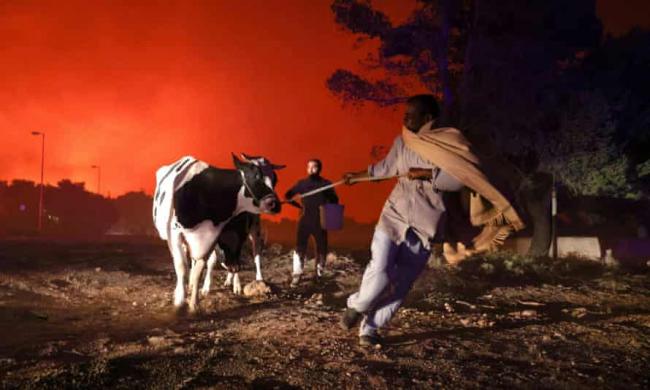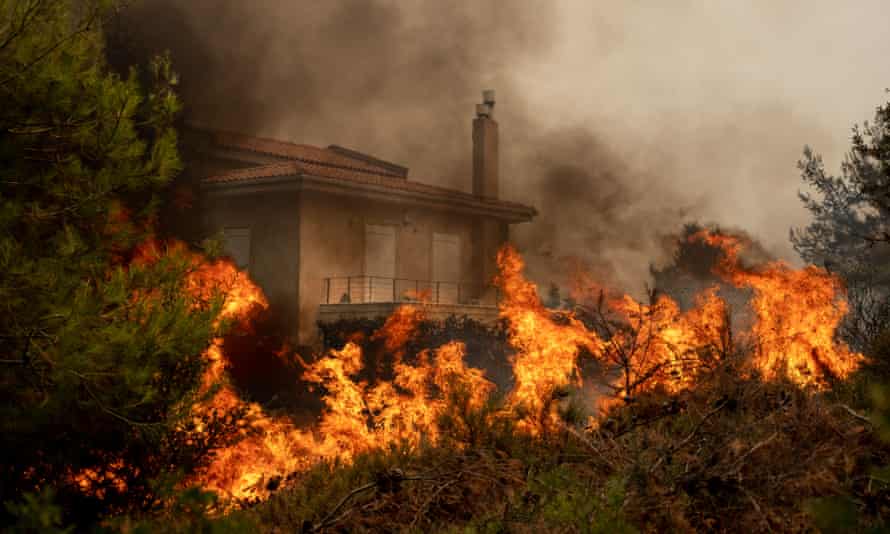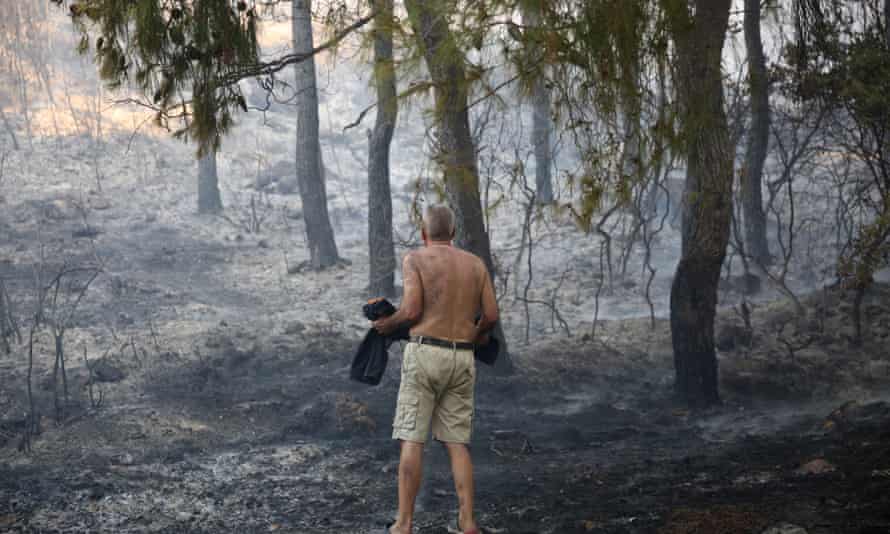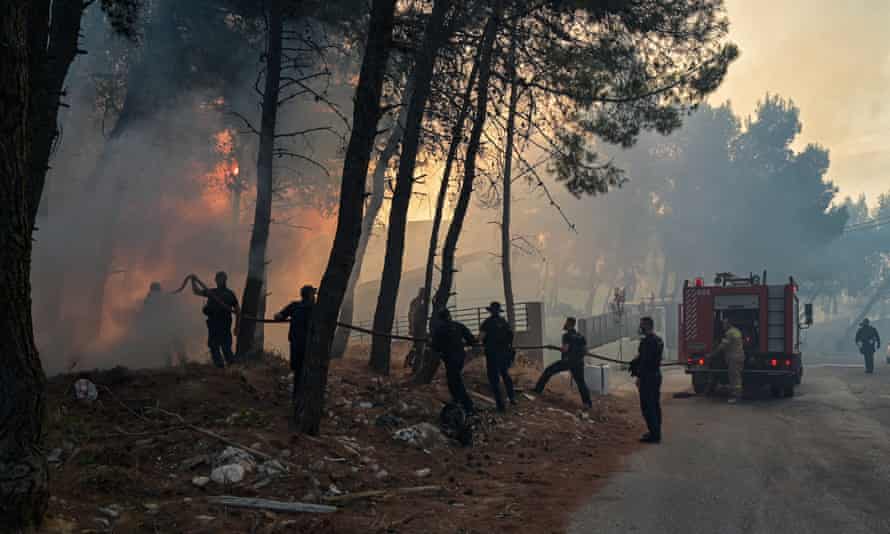Articles Menu

Aug. 7, 2021
Little had prepared any of us on the Athens-bound flight for the sight of the great fire-induced clouds that swept either side of the plane as it made its descent on Friday.
News of the extreme heat engulfing Greece had spread beyond its borders all week, packaged in increasingly desperate language. Temperatures were breaking records few had ever imagined. If Monday was bad, then Tuesday was worse. In some parts of the country, the mercury had hit 47C (117F), with thermal cameras on drones recording the ground temperature in downtown Athens at 55C.
By Wednesday, we were hearing that entire tracts of suburban forest on the Greek capital’s northern fringes had gone up in flames. Infernos seemingly redolent of Dante’s hell had incinerated everything in their path; friends had lost homes; thousands had been evacuated with residents and tourists fleeing blighted zones by any means possible. Terraces, an Athenian’s respite against the blazing heat, had been transformed into ash-laden no-go zones.
“It’s been crazy over here. Between the extreme heat and the wildfires, it feels apocalyptic,” Eleni Myrivili, a friend recently appointed to the role of Athens’ first chief heat officer, wrote in an email on Thursday as the army was deployed to assist firefighters. “Ash is raining down on us here in Athens.”
From the sky, it was frighteningly clear that the city was under siege, caught in a cycle of insufferable heat fuelling conflagrations on terrain so parched it was ready to ignite at any moment.
Fires, some big, some small, some extinguished and then rekindled, were raging nationwide, the country’s civil protection chief, Nikos Hardalias, told reporters. Conditions were not only “extremely dangerous” but unprecedented, he said, estimating that firefighters trying to protect populated areas, electricity installations and historic sites had battled 154 wildfires over the space of the week. More than 60 conflagrations were still raging on Saturday.

“Over the past few days, we have been facing a situation without precedent in our country, in the intensity and wide distribution of the wildfires, and the new outbreaks all over [Greece],” he said. “I want to assure you that all forces available are taking part in the fight.”
Under skies of acrid smoke – so dense, authorities urged residents to wear masks outdoors and close windows in their homes – other nations, including the UK, have stepped up to help this weekend, dispatching water-bombing planes, firefighters and vehicles to Athens.
Although temperatures had dropped after 11 days of exceeding 40C, winds also picked up on Friday, fanning new flashpoints in and around the city.
By Saturday a huge blaze that had burned through forests and houses towards Lake Marathon, the city’s main reservoir, was advancing up the slopes of Mount Parnitha, surrounding a national park regarded as Athens’ last substantial “green lung” and sending yet more choking smoke across the Attica basin.
On Evia, the island east of the capital, where fires have also rampaged from west to north across rugged woodland, dramatic scenes unfolded as ferries, tourist boats and fishermen rushed to evacuate more than 1,000 people from seaside villages and beaches. Men and women could be seen clutching babies and carrying the elderly and vulnerable on chairs as they boarded the ships to safety.

Further south in the Peloponnese, emergency services struggled for a fifth straight day to contain fires that have destroyed large parts of Ilia and Messinia and threatened ancient Olympia, where the Olympic flame is lit every four years.
Mindful of the huge loss of life from fires that tore through the seaside resort of Mati in the summer of 2018, the Greek government has prioritised evacuations.
Two deaths linked to the latest fires have so far been reported – one victim was a volunteer firefighter and the other Konstantinos Michalos, the British-educated head of the Athens chamber of commerce and industry, who was found dead after rushing to his factory as a devastating wildfire advanced on Kryoneri, a suburb in north-east Athens.
Greece’s prime minister, Kyriakos Mitsotakis, said climate change was clearly to blame for temperatures that “have turned the country into a powder keg” and sparked infernos described as the worst in decades in neighbouring Turkey and Italy.

Athens is the hottest metropolis in mainland Europe, with meteorologists predicting that annual mean temperatures across the Mediterranean will increase by up to 2C over the next 30 years.
But in the midst of darkness wrought by nature gone awry, extraordinary stories of valour also emerged last week.
Faced with the prospect of his home in Thrakomakedones in the foothills of Mount Parnitha being razed by fire at 3am on Saturday, Alexandros Rizos decided to stay on and “defend” the property. His wife and child safely evacuated, the 55-year-old business development consultant stood on the roof of the two-storey building, hosing his garden and the tops of pine trees in anticipation of the blaze approaching.
“I am very attached to this house,” said Rizos, an avid marathon runner, recounting the drama, which took place after four sleepless nights. “I hid when the order arrived to evacuate and when the fire came, it came like a typhoon, raining gold everywhere. I was there, alone and very frightened but I had also taken every measure. I had cleared the garden, removed pine cones. The typhoon lasted for about four minutes but the grass outside and the tree tops were wet enough for the fire to pass over.”
The appearance of firefighters minutes later and his own heroic efforts saved the entire neighbourhood from being reduced to cinders.
Like many, Rizos believes the climate emergency will only get worse. “We’re ecologists, we love nature in my family and we want to protect the environment, not install air conditioners that will destroy it. But with temperatures of 45C, that’s going to be hard. We have to adapt. For sure, I’ll be replacing pine trees with other trees that don’t burn so easily.”
Myrivili fears the effects of the destruction of so much forest around Athens. Mount Parnitha is a hub of biodiversity and home to some of Europe’s richest flora and fauna.
“These mountains around Athens are our life support,” she said, describing the challenge to mitigate heat as the battle of all battles now confronting Greece. “We’ve taken a huge step back. A vital part of our green infrastructure has gone. With all these trees no longer there, we’ll be faced with new climate conditions and have higher temperatures and likely floods in the metropolitan area of Athens for years to come.”
[Top photo: Locals fleeing with their animals as a wildfire rages in a suburb north of Athens. Photograph: Giorgos Moutafis/Reuters]